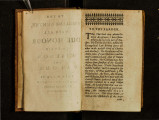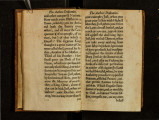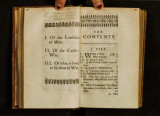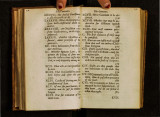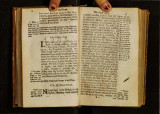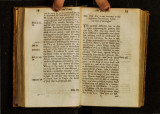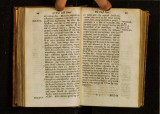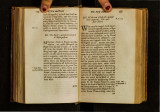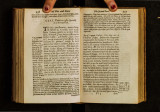| OCR Text |
Show fimply and plainly. But, if either the words do not ref pe6l: man , by conferrino upon him a right; or , if they do refpe§ him,but there is fomewhat ~ich may be oppos'd againH him; then , iuch will be the force of the oath , that indeed he can attain no right , yet neverthelefs he that hath fworn is bound to God to fiand to his oath. An example hereof i' in him, who by unjufl fear gave caufe to a fworn t Aulin wtcb. promife t. For he attains no right, or ttb,tbat an oath fuch as he ought to render , upon this txtortedby f6rct oround that he oave caufe to the lofs. So iulh(o ~~ b~ l(e?,! ~e fee theHebr~w Kings , both reproved fort e , .. v~, .. ~ . d . n... db G d of God. Epift. by the Prophets, an pununc y o , 'n4, t2.f, becaufe they kep~ not their faithfwornto Ezech. 17-U· the Babylonian Kings. Cicero commends 1 3· 15· the Tribune Pomponius, who performed 'JIe'arreJmtum. 2te.mJ·p7D· · what b e.m g compe ll.' d b y te~rour he .h a d ri6ruWi& jura- fworn. So much, fatth he, m thofettmes mtlftumvalebat. did an-oath prevail. Wherefore it was not Cic. O$c. 3· on7c the duty of Regulus to return to rottt.l ..... c.u.. pri ou, ho w . {1 r • . but of UI)JU 1: 10e r 1t was;, Offic. 3· thofe tenalio , wlwm Cicero menuon~,ta return to Anniba/: for they were obl1ged Tho.2..2..S9: by their oath. ttrt. 7.& ibi h p· t cajet. Alex. . XXXIX, Of an oat to a era e' I mol. in c. ve- or to a Tyrant, ,.,m, d~ jurejur. , , k Soto L,b. 8.q. J, NOr is it thos only among pub!Jc ~rt. 1· .._. b t amono all: For' the >t Gregoras : eneluleS ' u D is not Ptrjur;um Deo perfon alone to whom we fwearf., * \ culp~rn i'!'pingit ref petted; but He by whom we we 6 ar d' '{Jt!.lzgentut. o ' The /e&~nd PArt.· God , who fufficeth to create an oblioation. (icero tbe~efore is .to be reJetl~d, when he faith , it is no per jury , if th~ price promifed for life be not Drought un" to Robbers : becaufe a Pirate is not a determinate but a common enemy of all , with whom we ought to have no focicty either of faith or oath. Which is alfo faid by him elfewhere of a tyrant ; and by • · .· ~~ Brutus, in App~an, W1th a tyrant,the Ro- CJ'CJJl. ~<t: mans hlf,ve no faith , no Religion of an oath. But , as in the conftituted Law of Nations 'it is true, and.Jhall he fhewe4 hereafter , . that an enemy differs from a .. Pirate ; fo cannot that ·difference ,Pave .-place here, where, though the righ~ of the · t perfon is deficient, God is concerndt: for tPiuurchus which reafon an oath is called by the Lyfandro: name of a vow. Bdides-, it ~s not true .f5<..~i jur~tntD which Cicero affumes, that th~re is no fo .. hofl!mpmem-, c.te ty of r1. g ht w1.t h a R ob b' ~r. Fo r ,t was vanftn hto,{uie omft etnndtz-t. well anfwerd by Tryphonmus, that a tui, veum ""~ thing depolited is to refiored to a thief,., temni. · by the very Law of Na tions,if the owner "'Et ~i qfii thereof appear nor. Wherefore I cannot ~egn~m fi~c a1 1 ow t ha t wh .~ c h .IS de 1 .tv er d by rw ~e,t h~ t qJUuroem 1o.nqvoa O1r :o ~ he who hath promifed fome thing to a terni depoft-, Robber·, may farisfy his confcience with ~urn r~dditurn.. a momentaneous payment, fo that it mav b. Pnpen,enbr-- be lawfull for him to recover what • hJe• &u sv iodoory1 ~'" ~ hath payd. For the words, in an oath, as sicutuJ ;,exto Go.d, are to be underfiood moll fiq1J>W '~pt~ Ptirep~~ "' and with effeCt . . And ~herefore he th~t NU._ returned fe~etly to the cn~my ~ ana again |







